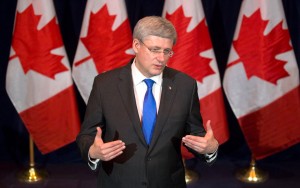Harper travel ban defended

Election promises are funny things.

Election promises are funny things.
As voters, we are meant to listen with a skeptical ear while understanding that promises made during the campaign period are rarely filled with specifics.
That’s what makes the opinion piece written in last week’s issue of The Cord titled, “The problems with Harper’s travel ban” so strange.
The article attacks the proposed ban on two fronts. It starts with questioning how the ban itself would work. Who would be allowed to travel to these areas, and what reasons would be considered valid?
The columnist poses these questions as if they are a crippling oversight, somehow rendering this ban futile. But these questions are really just small factors to consider when discussing the broader purpose of the proposal.
The columnist paints an imaginary scenario where someone who wants to travel to one of these destinations — for example, areas in Iraq or Syria — is presumed guilty of wanting to commit terror against Canada, and if they can’t provide a good reason, they will be criminally charged.
It’s remarkable that anyone can deduce the workings of a policy that hasn’t even been written into a bill yet.
These sorts of exaggerated, slanderous distortions of a reasonable idea is nothing but fear mongering, something Harper is ironically accused of.
The second problem the columnist has with this proposed ban, is that “there is no evidence that Canadians would leave for another place, pick up a terrorist starter kit and then return to Canada to get violent.”
This, too, strikes me as odd. Harper isn’t claiming large swaths of citizens are eager to make a round trip from Canada to an Islamic State hideout and then mount attacks across our country.
His thinking is that out of over 35 million Canadians, a small handful may intend to harm us.
Considering we’ve seen the danger that one person can pose to us, it’s a reasonable precaution, especially considering ISIS has taken to social media with the explicit intent of reaching people across the word trying to recruit them.
But that’s also not the only scenario in which this travel ban may help us. We shouldn’t just concern ourselves with people looking to leave and come back.
We should be stopping people from joining ISIS in the first place.
As mentioned prior, ISIS uses social media to recruit people from different countries. By letting these people go, we are allowing the ISIS army to grow.
What this ban would do is help cut off ISIS’ supply of potential soldiers while allowing us to keep tabs on Canadians here wanting to leave to join them. It’s a two-pronged solution.
Yes, it’s true that a potential terrorist may instead fly to another country where no travel ban exists, then take a plane to the war zone.
But flights aren’t cheap, and at the very least this inconvenience will cost a significant amount of money to get around.
We need to hope more countries follow Harper’s lead and implement similar obstacles.
On September 2, we witnessed a horrific image. A boy who was attempting to flee Syria, drowned during his escape.
His family was fleeing the war and destruction brought fourth by ISIS. Any responsible government should be committed to sending as few people to these places as possible.
Harper is pledging $100 million to help refugees from Syria.
Dealing with terrorism will always be a complicated matter. Any decision can lead to disaster.
So while every proposal should be questioned, we can’t be foolish enough to rule out potential dangers. A travel ban is a smart, effective, principled and completely justified, despite what Harper’s numerous detractors want to believe.


